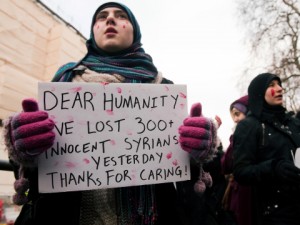 22 Syrian soldiers have been killed by rebels in the deadliest day of a three-week ceasefire that looks increasingly shaky.
22 Syrian soldiers have been killed by rebels in the deadliest day of a three-week ceasefire that looks increasingly shaky.
Fifteen troops, including two colonels, were killed in a rebel ambush at dawn in the northern province of Aleppo, said the Syrian Observatory for Human Rights.
Two rebels also died in the attack near Al-Rai village, after President Bashar al-Assad’s forces had ‘scaled up military operations’ there in the days since the truce took effect on April 12, said the watchdog.
Clashes near Damascus killed seven soldiers and a rebel fighter, while the army shelled and torched activists’ homes in eastern Deir Ezzor province, the watchdog said.
At least four civilians were also killed by army gunfire, including a woman who died in Deir Ezzor province and two civilians in Daraya near Damascus, where five soldiers were wounded the previous night.
Despite the bloodshed, the head of a UN military observer mission said his team was having a positive effect, although he admitted the ceasefire was not holding.
Major General Robert Mood brushed off criticism that the UN Supervision Mission in Syria, or UNSMIS, had been too slow to get off the ground and said their numbers would double within days.
‘This is not easy and we are seeing – by the action, by explosions, by firing – that the ceasefire is really a shaky one. It’s not holding,’ the Norwegian general told Britain’s Sky News.
‘But what we are also seeing on the ground is that where we have observers present, they have a calming effect and we’re also seeing that those operating on the ground, they take advice from our observers.’
However, Syria’s main opposition coalition urged observers to visit detention centres, saying there has been an ‘escalation of arrests’ across the country.
‘The Syrian National Council calls on the Security Council to pass a resolution demanding the Assad regime stop the escalation in arrests, murders and torture of detainees, and demand their release,’ the group said.
It also called for the observers to count the number of detained and ‘carry out frequent and unannounced visits to the prisons’ of those locked up in the 14-month uprising.
More than 100,000 people have been detained since the outbreak of the revolt, according to the Observatory which puts the number still behind bars at more than 25,000.
The United Nations has accused both the regime and its opponents of violating the ceasefire that is part of a peace plan brokered by UN-Arab League envoy Kofi Annan.
The plan calls for a halt to fighting, the withdrawal of heavy weapons from urban areas, a daily humanitarian ceasefire, media access, an inclusive political process, the right to demonstrate and the release of detainees.
More than 9000 people have been killed in Syria since the anti-regime uprising broke out in March 2011, according to UN estimates while the Observatory puts the figure at more than 11,100.
UN peacekeeping chief Herve Ladsous said troops have kept heavy weapons in cities, and that both the government and rebels have violated the truce.
Ladsous also said UN members had so far only offered 150 military observers for the 300-strong planned force and that Syria had refused visas for three proposed monitors.
But Syria’s foreign ministry denied visa requests had been turned down and said the two sides had agreed on the nationalities that could operate in the country.
Human Rights Watch (HRW) accused the regime of committing atrocities in the eastern province of Idlib shortly before the truce took effect.
‘Syrian tanks and helicopters attacked one town in Idlib after another,’ Anna Neistat, associate director for programs and emergencies at HRW, said in a statement.
‘It was as if the Syrian government forces used every minute before the ceasefire to cause harm,’ she added.
HRW said that during an April 3-4 attack on Taftanaz, northeast of Idlib city, 19 members of the Ghazal family, including two under the age of 18, were executed by regime forces. Nine males were shot in the head or back.
The violence in Syria has also seen tens of thousands of refugees take flight into neighbouring countries including Turkey, Lebanon, and Jordan.
Meeting with a US congressional delegation in Amman, King Abdullah II of Jordan, which says it hosts more than 100,000 Syrian refugees, called for ‘a political solution’ to the crisis, saying he was ‘worried’ about the bloodshed.
Influential US Senator Joe Lieberman met Syrian refugees in Lebanon, meanwhile, voicing support for the Syrian opposition.
Lieberman expressed concern that people in the region and around the world ‘have not done enough to be supportive of the opposition in Syria to Assad.’
Sky News

Leave a Reply
You must be logged in to post a comment.